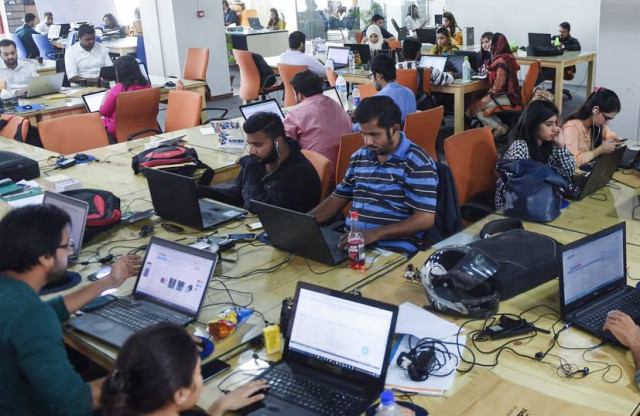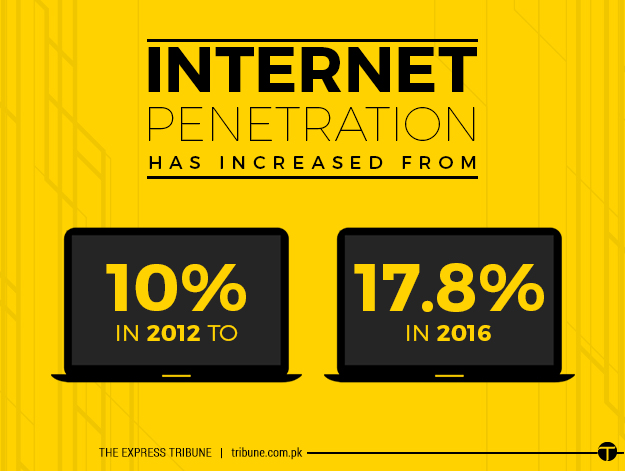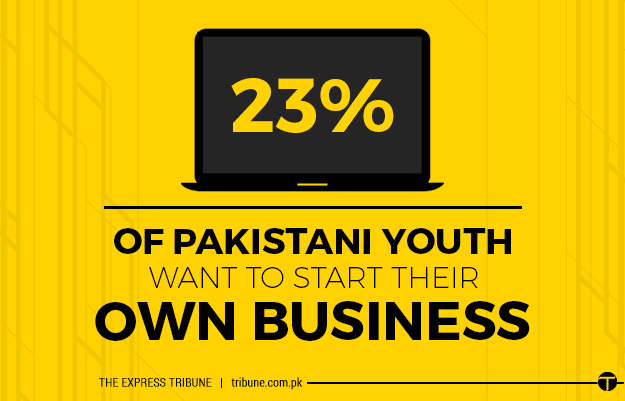Despite challenges, entrepreneurial landscape flourishing in Pakistan
Country is witnessing growth in commercial activities, says i2i report

The entrepreneurship ecosystem in the country is growing with a significant increase in the number of incubators, coworking spaces, competitions and other support players since 2012. PHOTO: AFP
According to the Pakistan Entrepreneurship Ecosystem Report 2016 by Invest2Innovate (i2i), the increase in business activities since 2014 is not only encouraging but validating as well.
i2i is very excited to announce the launch of our latest 2016 report on Pakistan's Entrepreneurship Ecosystem,... https://t.co/pQNqKGFYAm
— Invest2Innovate (@Invest2Innovate) November 3, 2016
Kalsoom Lakhani, the CEO and founder of i2i, said the reason for publishing the report was to serve investors and stakeholders in a way that would propel success stories in the future.
“The first report in 2014 was commissioned by the World Bank (CGAP) but we repackaged it and released it for the public because we believed the knowledge we've gained from working on the ground and hands-on in the entrepreneurship space in Pakistan is meant to be shared,” said Kalsoom in an emailed response to The Express Tribune. “This 2016 report is meant to further that knowledge and aims to be a jumping point for further data-driven research in the future, ideally for players like investors, stakeholders, and corporations. Their increased involvement in Pakistan will help propel success stories in the future.”
While the improved security situation has attracted foreign investments, the report said, increased entrepreneurial activities in the country are not only a reflection of a broader global trend but also a by-product of boosted internet penetration, which has blurred national boundaries and exposed people to innovation and development in other countries. Internet penetration in the country has increased from 10% in 2012 to 17.8% in 2016.
Commenting on how attractive Pakistan could be for investors worldwide, Kalsoom said the challenges faced by the country are opportunities themselves.
“I understand that Pakistan seems scary to people who don’t have another way of understanding it, but the challenges in these markets also present enormous opportunities for growth and change.
“Two-thirds of our country is under 30 years old. This means we have a young population with the drive and potential to change the environment around them - something we point to in this report, but that we've seen as a player in this space over the last five years.”
Five Pakistani startups to take part in US entrepreneurship programme
The report noted that the entrepreneurship ecosystem – the environment that supports the growth of businesses – is growing with a significant increase in the number of incubators, coworking spaces, competitions and other support players since 2012.
 ILLUSTRATION: NABEEL AHMED
ILLUSTRATION: NABEEL AHMEDAccording to the report, business in the country is becoming more and more localised and indigenised, with new initiatives launched by Pakistanis on the ground.
A number of local support organisations and entrepreneur leaders are on the rise, while the country’s main incubators and accelerators – including Plan9/PlanX, The Nest i/o, LCE and i2i – are producing more graduates, engaging more mentors.
Angel investment, which has largely been local and informal in the past with successful entrepreneurs investing in startups of their friends or entrepreneurs they already knew, has also shifted to be more formalised.
Investors are not only investing together but also launching institutional frameworks to deploy their capital. Some of the angel funds that have been created since 2014 include Dotzero Ventures, Cresventures, Arpatech Ventures, Fatima Ventures and Planet N.
Pakistan's leading tech firms crowned at P@SHA ICT awards
Even the corporate sector is playing a significant role supporting young Pakistani startups. While Telenor introduced its startup accelerator Velocity earlier this year, Mobilink is supporting the new National Incubation Centre. Menawhile, Unilever, Coca Cola and Engro Foods are also involved in projects to support local startups.
Telenor Velocity organizes Demo Day for their first startup batch.https://t.co/L3DxCa67oD pic.twitter.com/0kiNuGDVb7
— TechJuice (@TechJuicePk) October 27, 2016
The biggest encouraging sign for the entrepreneurial framework in the country is that a large number of youth are no longer interested in joining 9-5 corporate sector jobs.
 ILLUSTRATION: NABEEL AHMED
ILLUSTRATION: NABEEL AHMEDAccording to the United Nations Development Programme (UNDP), 23% of Pakistani youth want to start their own businesses. Although this is encouraging, most of them “are clueless on the procedures and requirements” for starting a business, which indicates a need to strengthen the entrepreneurship ecosystem in the country to support young entrepreneurs, the report noted.
Federal agencies and institutions, the report maintained, can play a a role in diluting risk for potential financiers investing in promising companies, urging the government to reduce barriers in access to finance for small business owners.
The report also urged the government incentivise the State Bank of Pakistan, which holds a lot of influence in this regard, to change legislation and provisions that apparently are holding businesses back.
As players in the entrepreneurial framework continue to increase, all the stakeholders should work together to strengthen the pipeline for new startups, the study concluded.
Words of advice
While one may see a trending startup culture in Pakistan, several companies have fallen off-radar way too soon. Kalsoom says the reason why startups tend to fail is that “too much” onus is put on the founder versus on the execution of the idea.
“I think we often put too much onus on the idea or the founder versus on the execution of the idea.
“Poor execution, a lack of humility, and the inability to listen to your target customers are key ingredients for failure.”



















COMMENTS
Comments are moderated and generally will be posted if they are on-topic and not abusive.
For more information, please see our Comments FAQ